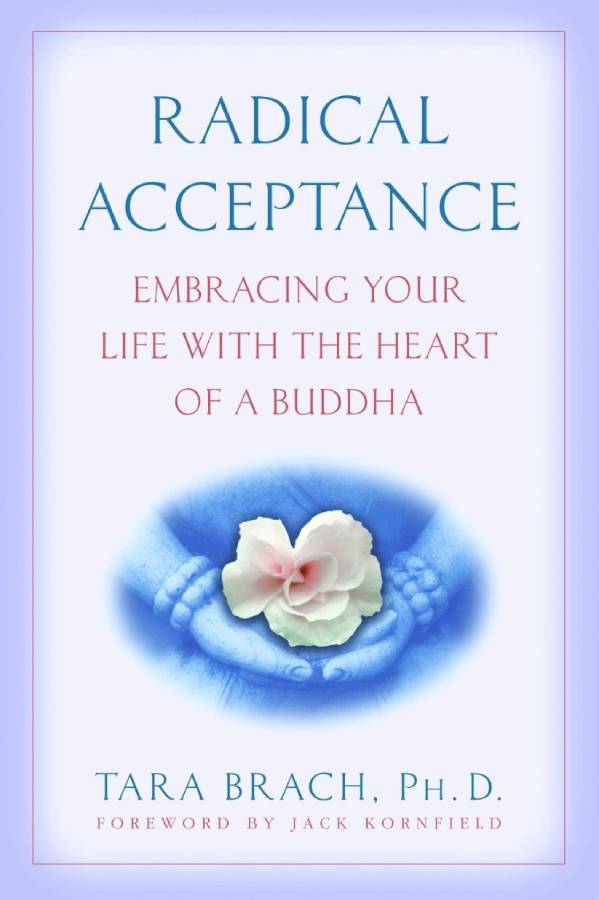In the tumultuous landscape of human emotions, where joy often dances hand-in-hand with despair, a beacon of tranquility emerges—the concept of Radical Acceptance. This transformative philosophy, encapsulated within the pages of a pivotal book, invites readers to embrace the full spectrum of their experiences with grace and resilience. Like a phoenix rising from the ashes of suffering, Radical Acceptance is not merely a practice; it is a powerful mindset that nurtures healing and growth.
At its core, Radical Acceptance advocates for a revolutionary way of being, one that transcends the conventional boundaries of resistance and denial. Imagine standing at the precipice of a cliff, eyes fixed upon the vast ocean below. The waves crash relentlessly against the rocks, symbolizing the relentless trials and tribulations of life. Instead of shying away from this churning sea of challenges, the practice encourages us to dive in, to fully experience the currents and tides that shape our existence. This dive is not one of hopeless surrender, but rather an exhilarating plunge into authenticity.
The metaphor of the ocean serves as a poignant reminder of the fluidity of life. Just as the ocean ebbs and flows, so do our emotions and circumstances. By accepting this vital truth, we unlock the doors to freedom. Radical Acceptance relinquishes the need to control every aspect of our lives, allowing us to navigate uncertainty with a newfound sense of peace. The book delves into this duality—how acceptance and change can coexist harmoniously, much like the sea’s surface and its depths.
Throughout the narrative, readers are invited to ponder deeply the origins of their suffering. It is here that the author deftly elucidates the intricate interplay between acceptance and emotional pain. We often shield ourselves from discomfort, erecting fortresses of denial and avoidance. However, the relentless pursuit of comfort often leads us into the treacherous territory of stagnation. Instead of fostering growth, this trepidation can gnaw at our psyche, leaving us unfulfilled. By confronting our emotional landscapes—with all their jagged edges and murky depths—we enable transformation. As we navigate through this emotional wilderness, Radical Acceptance becomes our compass.
A captivating aspect of this book is its ability to resonate with diverse audiences, appealing to both the weary and the adventurous souls alike. For those grappling with loss, trauma, or chronic pain, the principles outlined within these pages offer solace. It suggests that acceptance does not equate to complacency; rather, it is a powerful catalyst for healing. Like a seasoned gardener, we learn to tend to the weeds of our past experiences, clearing the way for new growth to flourish in our lives.
An essential highlight arises from the exploration of the self—how our internal narratives can shape our perceptions of reality. The book illuminates the ways in which we often succumb to distorted thinking patterns, reinforcing learned helplessness. This unhealthy internal monologue can trap us in a cycle of despair, obscuring the beauty of the present moment. Radical Acceptance serves as a magnifying glass, urging us to examine these narratives critically while illuminating the path to self-compassion and empowerment.
The author postulates that acceptance is akin to a loving embrace, a resounding affirmation of our existence. This introspection leads to a profound realization: when we fully accept our emotions—the joy, the pain, the anger—we reclaim our power. As if casting off the shackles of expectation and judgment, we emerge renewed. The act of acceptance is described not as a passive resignation but as an active engagement with life, a call to arms for emotional resilience.
Moreover, the power of community is underscored throughout the text. Just as the ocean connects distant shores, so too does our shared experience unite us. Radical Acceptance highlights the importance of vulnerability in forging meaningful connections. When we open our hearts to others, revealing our struggles and triumphs, we foster authentic relationships that enrich our lives. This communal embrace acts as a balm for our wounds, reinforcing the idea that we are not alone in our journey. The interconnectedness of human experiences is beautifully illustrated, accentuating the richness that arises from understanding our collective humanity.
Of particular note is the striking imagery woven throughout the text. The author’s evocative language captures the essence of Radical Acceptance, compelling readers to engage not only with their intellect but also with their emotions. Analogies to nature abound, framing complex concepts in tangible forms that resonate deeply. From the unyielding mountains to the delicate petals of a flower, the metaphors invigorate the narrative, leaving an indelible mark on the reader’s mind.
Ultimately, the allure of Radical Acceptance lies in its simplicity and profundity. It invites readers to cultivate a practice of mindfulness—an attentive awareness of the present moment, unmarred by judgment or regret. The realization that life, with its myriad complexities, is inherently unpredictable becomes liberating. In relinquishing our rigid expectations, we open ourselves to the serendipitous beauty that unfolds within the chaos.
As the final pages turn, readers are left with a profound sense of possibility. Radical Acceptance is not a panacea but rather a guiding philosophy that encourages exploration and growth. It champions the idea that, through the acceptance of life’s inevitable imperfections, we can navigate the tumultuous seas of existence with courage and grace. Embracing Radical Acceptance transforms our relationship with suffering, empowering us to ride the waves rather than being swept away by them.
This captivating book serves as a beacon for those yearning to reclaim their lives from the grips of despair, offering tools and insights that foster resilience and connection. It beckons us to plunge into the depths of our being, reminding us that every experience, no matter how painful, is an integral part of our shared journey as humans.
